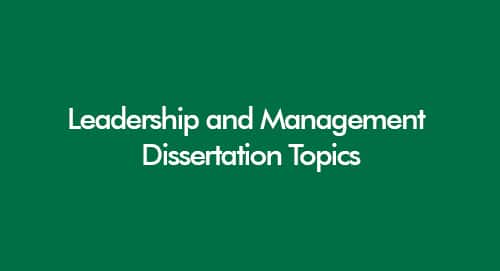
Top 2025 Dissertation Writing Tips
May 21, 2025
How Can Students Learn to Build Strong Arguments on Any Topic?
May 22, 2025Business Administration is a vital field that focuses on managing and leading businesses in competitive markets. Research in this area offers valuable insights into effective business operations. Choosing fresh and relevant business dissertation topics is key to producing a high-quality study.
Business Dissertation Examples
Our PhD experts have prepared an up-to-date list of business administration thesis topics for 2025.
MBA Dissertation Topics | Sustainable Business Dissertation Topics
ESG Strategies for 2025: Trending Project Topics for Business Administration
- How does AI integration in ESG strategies affect financial performance metrics?
- What are the measurable benefits of AI-driven ESG initiatives on organisational profitability?
- What are consumer perceptions of carbon-neutral supply chains in the retail sector?
- How do these perceptions influence consumer purchasing behaviour?
- How are ESG factors currently incorporated into investment decision-making processes?
- What is the impact of ESG integration on investment performance and risk assessment?
- What green marketing strategies are most effective in building brand loyalty?
- How does consumer awareness of sustainability efforts affect brand perception?
- What are the common challenges SMEs encounter when implementing ESG reporting?
- How can SMEs overcome these challenges to align with global sustainability standards?
📚 Explore Interesting Business Administration Dissertation Examples
Most Researched Project Topics for Masters in Business Administration
Top Business Administration Research Project Topics
Sustainable Research Topics in MBA
Top Rated Thesis Topics in Business Administration
Best Thesis Titles for Business Administration Students in 2025
List of MBA Finance Project Topics
Topic 50. Analysing the Influence of Transformational Leadership on Employee Retention in Tech Startups: A Case Study of London-Based Firms
Topic 51. Assessing the Effectiveness of Customer-Centric Strategies in Driving Brand Loyalty: A Quantitative Study of the FMCG Sector
Topic 52. Examining the Impact of Sustainable Supply Chain Practices on Corporate Performance: A Systematic Study of European Retailers
Topic 53. Evaluating the Role of Artificial Intelligence in Enhancing Decision-Making Processes in SMEs: A Qualitative Study in the UK
Topic 54. Understanding the Relationship Between Corporate Social Responsibility Initiatives and Consumer Perception: A Quantitative Study in the Automobile Industry
Topic 55. Examining the Challenges and Opportunities of Remote Work Implementation Post-Pandemic: A Case Study of Multinational Corporations in Europe
Topic 56. Analysing the Effect of Dynamic Pricing Strategies on Consumer Purchase Behaviour in E-Commerce: A Systematic Study
Topic 57. Assessing the Impact of Organisational Culture on Innovation Capabilities: A Case Study of High-Growth Startups
Topic 58. Evaluating the Role of Digital Marketing Tools in Enhancing SME Market Competitiveness: A Qualitative Study in the Retail Sector
Topic 59. Understanding the Strategic Implications of Blockchain Adoption in Supply Chain Management: A Systematic Study of Global Logistics Firms
Supply Chain Topics in Business Administration (MBA) for 2025
Topic 60. Analysing the Role of Artificial Intelligence in Optimising Supply Chain Operations: A Qualitative Study
Topic 61. Evaluating the Impact of Blockchain Technology on Supply Chain Transparency: A Systematic Study
Topic 62. Examining the Effectiveness of Digital Twins in Improving Supply Chain Resilience: A Case Study
Topic 63. Assessing the Role of Sustainable Supply Chain Practices in Enhancing Corporate Social Responsibility: A Quantitative Study
Topic 64. Exploring the Use of IoT Devices in Real-Time Supply Chain Monitoring: A Systematic Study
Topic 65. Understanding the Impact of Green Logistics on Reducing Carbon Emissions: A Qualitative Study
Topic 66. Analysing the Role of Predictive Analytics in Enhancing Demand Forecast Accuracy: A Case Study
Topic 67. Evaluating the Impact of Autonomous Vehicles on Last-Mile Delivery Efficiency: A Quantitative Study
Topic 68. Examining the Challenges of Circular Supply Chain Implementation in Emerging Markets: A Qualitative Study
Topic 69. Assessing the Effect of Supplier Relationship Management on Supply Chain Risk Mitigation: A Systematic Study
Topic 70. Exploring the Role of Cloud Computing in Enhancing Supply Chain Collaboration: A Case Study
Topic 71. Understanding the Impact of Trade Wars on Global Supply Chain Configurations: A Qualitative Study
Topic 72. Analysing the Adoption of Robotic Process Automation (RPA) in Warehouse Management: A Quantitative Study
Topic 73. Evaluating the Use of Big Data Analytics in Identifying Supply Chain Bottlenecks: A Systematic Study
Topic 74. Examining the Role of Dynamic Pricing Models in Improving Supply Chain Profitability: A Case Study
Topic 75. Assessing the Role of Cybersecurity Measures in Protecting Supply Chain Data Integrity: A Quantitative Study
Topic 76. Exploring the Challenges of Multi-Modal Logistics Integration in E-Commerce Supply Chains: A Qualitative Study
Topic 77. Understanding the Impact of Lean Supply Chain Practices on Operational Efficiency: A Systematic Study
Topic 78. Analysing the Role of Collaborative Supply Chain Networks in Achieving Agility: A Case Study
Topic 79. Evaluating the Effectiveness of AI-Driven Route Optimisation Tools in Reducing Delivery Costs: A Quantitative Study
E-Commerce Topics in Business Administration (MBA) for 2025
Topic 80. Analysing the Role of Personalisation in Enhancing Customer Experience in E-Commerce: A Qualitative Study
Topic 81. Evaluating the Impact of Social Media Advertising on E-Commerce Sales Growth: A Quantitative Study
Topic 82. Examining the Role of Augmented Reality in Improving Online Shopping Experiences: A Case Study
Topic 83. Assessing the Impact of AI-Driven Chatbots on Customer Retention in E-Commerce: A Systematic Study
Topic 84. Exploring the Use of Blockchain Technology in Ensuring Secure E-Commerce Transactions: A Qualitative Study
Topic 85. Understanding the Role of Subscription Models in Driving Revenue for E-Commerce Platforms: A Quantitative Study
Topic 86. Analysing the Challenges of Cross-Border E-Commerce Logistics: A Case Study
Topic 87. Evaluating the Effectiveness of Dynamic Pricing Strategies in E-Commerce: A Systematic Study
Topic 88. Examining the Influence of User-Generated Content on Purchase Decisions in E-Commerce: A Qualitative Study
Topic 89. Assessing the Impact of Voice Commerce on Consumer Behaviour: A Quantitative Study
Topic 90. Exploring the Role of Sustainability Initiatives in E-Commerce Branding: A Case Study
Topic 91. Understanding the Effect of Mobile App Usability on E-Commerce Customer Loyalty: A Systematic Study
Topic 92. Analysing the Role of Data-Driven Marketing in Enhancing E-Commerce Performance: A Qualitative Study
Topic 93. Evaluating the Impact of Influencer Partnerships on E-Commerce Brand Awareness: A Quantitative Study
Topic 94. Examining the Use of Gamification Strategies to Increase Engagement in E-Commerce Platforms: A Case Study
Topic 95. Assessing the Role of Omni-Channel Strategies in Improving Customer Satisfaction in E-Commerce: A Systematic Study
Topic 96. Exploring the Challenges of Return Management in E-Commerce Supply Chains: A Qualitative Study
Topic 97. Understanding the Impact of Cybersecurity Practices on Consumer Trust in E-Commerce: A Quantitative Study
Topic 98. Analysing the Influence of Same-Day Delivery Services on Customer Satisfaction: A Case Study
Topic 99. Evaluating the Role of Artificial Intelligence in Predicting Consumer Preferences in E-Commerce: A Systematic Study
Marketing Topics in Business Administration (MBA) for 2025
Topic 100. Analysing the Effectiveness of Emotional Branding Strategies in Building Customer Loyalty: A Case Study
Topic 101. Evaluating the Impact of Content Marketing on Lead Generation in B2B Enterprises: A Quantitative Study
Topic 102. Examining the Role of Neuromarketing in Predicting Consumer Purchase Behaviour: A Systematic Study
Topic 103. Assessing the Effectiveness of Influencer Marketing Campaigns on Brand Equity: A Qualitative Study
Topic 104. Exploring the Impact of Augmented Reality on Marketing Strategies for Retail Brands: A Case Study
Topic 105. Understanding the Role of Customer Relationship Management (CRM) Systems in Personalised Marketing: A Quantitative Study
Topic 106. Analysing the Challenges of Cross-Cultural Marketing in Global Branding: A Qualitative Study
Topic 107. Evaluating the Use of Big Data Analytics in Optimising Digital Marketing Campaigns: A Systematic Study
Topic 108. Examining the Effectiveness of Green Marketing Strategies in Driving Brand Loyalty: A Quantitative Study
Topic 109. Assessing the Role of Omnichannel Marketing in Enhancing Customer Engagement: A Case Study
Topic 110. Exploring the Influence of Social Media Algorithms on Consumer Purchase Decisions: A Systematic Study
Topic 111. Understanding the Impact of Interactive Content on Consumer Engagement in Digital Marketing: A Quantitative Study
Topic 112. Analysing the Role of Storytelling in Building Emotional Connections with Customers: A Qualitative Study
Topic 113. Evaluating the Impact of Mobile Marketing Campaigns on Consumer Behaviour: A Case Study
Topic 114. Examining the Role of Artificial Intelligence in Predictive Marketing Strategies: A Systematic Study
Topic 115. Assessing the Effectiveness of Loyalty Programmes in Enhancing Customer Retention: A Quantitative Study
Topic 116. Exploring the Use of Gamification in Marketing Strategies for Millennials: A Case Study
Topic 117. Understanding the Impact of Negative Online Reviews on Brand Reputation: A Systematic Study
Topic 118. Analysing the Effectiveness of Programmatic Advertising in Increasing Conversion Rates: A Quantitative Study
Topic 119. Evaluating the Role of Experiential Marketing in Creating Memorable Brand Experiences: A Qualitative Study
Sustainable Business Topics in Business Administration (MBA) for 2025
Topic 120. Exploring the Role of Circular Economy Practices in Sustainable Business Models: A Qualitative Study
Topic 121. Evaluating the Impact of Corporate Sustainability Initiatives on Brand Reputation: A Case Study
Topic 122. Examining the Effectiveness of Green Supply Chain Management in Reducing Carbon Footprints: A Quantitative Study
Topic 123. Assessing the Adoption of Renewable Energy Solutions in Business Operations: A Systematic Study
Topic 124. Understanding the Role of Sustainable Leadership in Driving Organisational Growth: A Qualitative Study
Topic 125. Analysing the Integration of Sustainability Goals in Corporate Strategy Development: A Case Study
Topic 126. Evaluating the Economic Benefits of Adopting Sustainable Business Practices: A Quantitative Study
Topic 127. Examining the Impact of Sustainable Packaging Solutions on Consumer Purchasing Behaviour: A Systematic Study
Topic 128. Assessing the Effectiveness of Sustainability Reporting in Enhancing Stakeholder Trust: A Qualitative Study
Topic 129. Exploring the Role of Employee Engagement in Achieving Organisational Sustainability Goals: A Case Study
Topic 130. Understanding the Challenges of Transitioning to Sustainable Business Practices in Emerging Markets: A Systematic Study
Topic 131. Analysing the Impact of Green Marketing Strategies on Brand Loyalty: A Quantitative Study
Topic 132. Evaluating the Role of Technology in Promoting Sustainable Business Innovations: A Qualitative Study
Topic 133. Examining the Effectiveness of Corporate Social Responsibility (CSR) in Supporting Sustainability Goals: A Case Study
Topic 134. Assessing the Contribution of Eco-Labelling to Consumer Awareness in the Retail Industry: A Quantitative Study
Topic 135. Exploring the Integration of Blockchain Technology in Enhancing Transparency in Sustainable Business Practices: A Systematic Study
Topic 136. Understanding the Role of Sustainable Investment Funds in Shaping Business Strategies: A Qualitative Study
Topic 137. Analysing the Impact of Climate Change Policies on Long-Term Business Sustainability: A Case Study
Topic 138. Evaluating the Role of Sustainable Innovation in Enhancing Competitive Advantage: A Quantitative Study
Topic 139. Examining the Effectiveness of Public-Private Partnerships in Driving Sustainability Projects: A Systematic Study
Topic 140. Assessing the Challenges of Balancing Profitability and Sustainability in Business Decision-Making: A Qualitative Study
Interesting BBA Thesis Topics 2025
Topic 141. Exploring the Impact of Leadership Styles on Employee Motivation: A Qualitative Study
Topic 142. Evaluating the Role of Social Media in Brand Promotion: A Case Study of Startups
Topic 143. Examining the Influence of Organisational Culture on Team Performance: A Quantitative Study
Topic 144. Assessing the Effectiveness of Employee Training Programs in Enhancing Productivity: A Systematic Study
Topic 145. Understanding the Role of Customer Relationship Management (CRM) in Improving Customer Retention: A Case Study
Topic 146. Analysing the Impact of Digital Marketing Strategies on Small Business Growth: A Qualitative Study
Topic 147. Evaluating the Effects of Ethical Business Practices on Consumer Loyalty: A Quantitative Study
Topic 148. Examining the Influence of Flexible Working Arrangements on Employee Satisfaction: A Systematic Study
Topic 149. Assessing the Challenges Faced by Family-Owned Businesses in the Digital Age: A Case Study
Topic 150. Exploring the Role of Innovation in Developing Competitive Business Strategies: A Qualitative Study
Topic 151. Understanding the Effect of Financial Management Practices on Business Performance: A Case Study
Topic 152. Analysing the Relationship Between Work-Life Balance and Employee Productivity: A Quantitative Study
Topic 153. Evaluating the Impact of Sustainable Business Practices on Brand Image: A Systematic Study
Topic 154. Examining the Challenges of E-commerce Adoption Among Traditional Retailers: A Case Study
Topic 155. Assessing the Role of Technology in Streamlining Supply Chain Operations: A Qualitative Study
Topic 156. Exploring the Effectiveness of Corporate Social Responsibility (CSR) Initiatives in Enhancing Stakeholder Relationships: A Systematic Study
Topic 157. Understanding the Relationship Between Pricing Strategies and Consumer Purchasing Decisions: A Quantitative Study
Topic 158. Analysing the Influence of Entrepreneurial Leadership on Business Growth in Startups: A Case Study
Topic 159. Evaluating the Role of Cross-Cultural Management in Multinational Corporations: A Systematic Study
Topic 160. Examining the Effect of Brand Loyalty Programs on Customer Retention: A Qualitative Study
Business Administration Thesis Topics For PhD Students 2025
Topic 161. Analysing the Role of Artificial Intelligence in Shaping Strategic Business Decisions: A Systematic Study
Topic 162. Evaluating the Effectiveness of Blockchain Technology in Enhancing Supply Chain Transparency: A Case Study
Topic 163. Examining the Impact of Dynamic Pricing Models on Consumer Behaviour in E-Commerce: A Quantitative Study
Topic 164. Assessing the Influence of Leadership Styles on Organisational Resilience During Crises: A Qualitative Study
Topic 165. Exploring the Role of Green Marketing Strategies in Enhancing Corporate Reputation: A Systematic Study
Topic 166. Understanding the Relationship Between Employee Engagement and Organisational Productivity: A Case Study
Topic 167. Analysing the Effects of Digital Transformation on Business Model Innovation in SMEs: A Quantitative Study
Topic 168. Evaluating the Role of Social Media Analytics in Driving Customer-Centric Marketing Strategies: A Qualitative Study
Topic 169. Examining the Effectiveness of Corporate Governance Practices on Financial Performance: A Systematic Study
Topic 170. Assessing the Challenges and Opportunities of Circular Economy Adoption in the Manufacturing Sector: A Case Study
Topic 171. Exploring the Role of Ethical Leadership in Fostering Organisational Commitment: A Qualitative Study
Topic 172. Understanding the Impact of Corporate Social Responsibility Initiatives on Brand Loyalty: A Quantitative Study
Topic 173. Analysing the Role of Big Data Analytics in Improving Decision-Making in Supply Chain Management: A Systematic Study
Topic 174. Evaluating the Impact of Remote Work Policies on Organisational Culture: A Case Study
Topic 175. Examining the Influence of Marketing Automation Tools on Customer Retention in the Service Sector: A Quantitative Study
Topic 176. Assessing the Effectiveness of Talent Management Strategies in Multinational Corporations: A Qualitative Study
Topic 177. Exploring the Relationship Between Business Ethics and Long-Term Profitability: A Systematic Study
Topic 178. Understanding the Role of Knowledge Management in Driving Innovation in Technology Firms: A Case Study
Topic 179. Analysing the Influence of Cross-Cultural Management Practices on Team Effectiveness: A Quantitative Study
Topic 180. Evaluating the Impact of Sustainable Investment Strategies on Corporate Financial Performance: A Systematic Study
Business Administration Dissertation Topics for Master Students in 2025
Topic 181. Analysing the Effectiveness of Digital Marketing Strategies on Customer Engagement in E-Commerce: A Quantitative Study
Topic 182. Evaluating the Role of Customer Relationship Management Systems in Enhancing Business Performance: A Case Study
Topic 183. Examining the Impact of Corporate Social Responsibility on Brand Image and Consumer Trust: A Systematic Study
Topic 184. Assessing the Effect of Leadership Styles on Employee Motivation and Organisational Performance: A Qualitative Study
Topic 185. Exploring the Influence of Supply Chain Resilience on Business Continuity in Global Industries: A Case Study
Topic 186. Understanding the Impact of Strategic Innovation on Competitive Advantage in Startups: A Qualitative Study
Topic 187. Analysing the Role of Organisational Culture in Shaping Employee Satisfaction and Retention: A Quantitative Study
Topic 188. Evaluating the Effectiveness of Remote Work Policies on Employee Productivity and Work-Life Balance: A Systematic Study
Topic 189. Examining the Relationship Between Financial Performance and Corporate Governance in UK-Based Firms: A Case Study
Topic 190. Assessing the Impact of Artificial Intelligence on Customer Service Quality in Retail Businesses: A Quantitative Study
Topic 191. Exploring the Impact of Marketing Automation on Customer Retention and Loyalty: A Case Study
Topic 192. Understanding the Role of Data-Driven Decision-Making in Improving Business Operations: A Systematic Study
Topic 193. Analysing the Impact of Sustainability Practices on Business Profitability in the Manufacturing Sector: A Quantitative Study
Topic 194. Evaluating the Use of Big Data Analytics in Enhancing Supply Chain Efficiency: A Case Study
Topic 195. Examining the Role of Emotional Intelligence in Leadership Effectiveness: A Qualitative Study
Topic 196. Assessing the Impact of Digital Transformation on Traditional Business Models: A Systematic Study
Topic 197. Exploring the Role of Ethical Decision-Making in Business Success: A Case Study
Topic 198. Understanding the Factors Influencing Consumer Behaviour in Online Shopping: A Quantitative Study
Topic 199. Analysing the Impact of Globalisation on Small and Medium-Sized Enterprises (SMEs): A Case Study
Topic 200. Evaluating the Success Factors of Business Incubators in Fostering Entrepreneurship: A Qualitative Study
How to Find a Strong Research Topic about Business Administration
To succeed academically, students must choose a good business research topic for their MBA or a thesis topic in business administration. You should be able to portray your unique position in a relevant research field. Therefore, our writers have carefully drafted topics which include;
- The MBA Finance project topics, so you can review the financial and economic aspects of business administration.
- MBA dissertation topics in project management so you can analyse how business administration practices are best optimised concerning project management aspects.
- Business administration research project topics for leadership, so you can research the importance of leading in an organization.
- Business management project topics, so you can review how multi-national businesses function in the modern age and also the management aspects of businesses.
Fill out the form to get 3 free custom MBA topics within 24 hours!
Get Expert Advice Before Deciding on an Business Administration Dissertation Topic
Choosing a dissertation topic in Business Administration can be difficult for many students. A good topic should offer new ideas and be relevant to the field. Popular areas include marketing, human resource management, entrepreneurship, business sustainability, and BBA-level topics. Reviewing examples can help you pick a topic that is both interesting and valuable.
List of Latest Dissertation Topics 2025 | Dissertation Proposal Help
For more business administration thesis topics or topic in business management, please keep visiting our website, as we keep updating our existing list of topics.
Good luck!
About the Author
Dr. Jane Smith, PhD in Business Administration, is a leading researcher with over 15 years of experience in business and management research. She has published extensively in journals like Business Management and advises academic institutions on business curricula.
Get 3+ Free Business Administration Dissertation Topics within 24 hours.




























